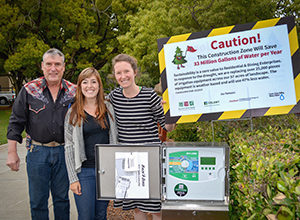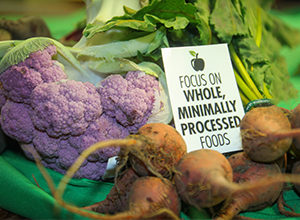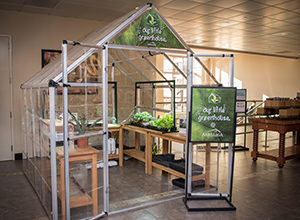Residential & Dining Enterprises (R&DE), which comprises Student Housing, Stanford Dining, Stanford Hospitality & Auxiliaries, Stanford Conferences, and a team of strategic business partners, supports the academic mission of the university by providing the highest-quality services to the university community in a sustainable and fiscally responsible manner.
As Stanford’s largest auxiliary department, R&DE provides housing for over 13,000 students and family members, serves 12,000 meals daily, and hosts over 20,000 residential summer conference visitors each year. R&DE manages more than 5 million square feet of residential, dining, and office space—roughly one-third of the campus—and is the largest provider of food service on campus, serving more than 6.5 million meals annually. These efforts directly affect student learning, the overall campus culture, and the lives of Stanford students after graduation.
R&DE is a leader in campus-wide sustainability efforts. R&DE’s senior associate vice provost, Shirley Everett, is a member of the Provost’s Committee on Sustainability, and she has set a compelling vision and goals to educate students, staff, and the campus community; promote sustainable practices and influence behaviors; reduce waste, conserve resources, and minimize our environmental footprint; and measure our progress. Sustainability is a core value and a way of life within the organization.
Two hallmark sustainability initiatives, among many across R&DE, are Student Housing’s Sustainable Living Program and the Sustainable Food Program, which supports Stanford Dining and Stanford Hospitality & Auxiliaries. These programs create positive impacts by collaborating with students, staff, faculty, other campus stakeholders, vendors, and suppliers as co-creators in a responsible and sustainable business. They report on sustainability indicators, provide education and outreach for staff and students through lectures and sustainability events, and audit operational practices and standards for conservation across R&DE.
Results
The R&DE Sustainable Living Program is committed to influencing generations of students to lead sustainable lifestyles, not only on campus, but in their future communities. R&DE Student Housing does this by providing infrastructure that encourages sustainable living.
For example, all residences are equipped with plumbing fixtures that adhere to strict low-flow standards to save water, and they all have access to composting and recycling services. The program also fosters behavioral changes through residence workshops, competitions, and campaigns that encourage individual action. Students receive guidance on what to bring to campus, how to interact with their building’s heating and cooling systems, how and where to sort waste, and how to report water leaks.
Key programs for R&DE Student Housing in the 2015-16 academic year included the following:

Irrigation retrofits are saving over 33 million gallons of water each year
- In response to California’s drought, in 2015 R&DE Student Housing led an irrigation retrofit project to reduce landscape irrigation by 46%, or 33 million gallons of water. During this first year of performance the project significantly exceeded expectations, reducing water usage by over 66%.
- Working as interns, through student groups, or on class projects, 19 students supported a variety of sustainability initiatives in residences. For example, two students performed a first-of-its-kind study on student room-lighting behavior that led to a successful application for LED light retrofit rebates, and another group of students analyzed behavior at waste corrals and recommended standards for bin placement and signage to improve sorting.
- A new outreach video was released for the annual Give & Go program, which seeks to reduce waste sent to landfill as students move out at the end of the academic year. The video featured a Stanford student and the Give & Go mascot, the alpaca (alpaca my stuff), to encourage students to donate and recycle.
- Following a successful pilot in 2014-15, the green cleaning system expanded to Lantana, Castaño, and the five Cowell Cluster residences.
- Compost collection for paper towels in restrooms was added in the two primary freshman residences, Wilbur and Stern, affecting 1,300 students.
- A water-reduction competition, Wilbur Water Wars, challenged students to reduce their average shower time. The competition saw a 10% reduction in water usage, or a little over 30,000 gallons of water saved, and a two-minute average reduction in shower time.
The R&DE Sustainable Food Program meaningfully participate in the education of the world’s future leaders by sharing knowledge and creating awareness of food culture, systems, and production. R&DE Stanford Dining and R&DE Stanford Hospitality & Auxiliaries are committed to providing healthy and delicious meals that nourish students while supporting a sustainable future and positively influencing lifelong eating behaviors. The strategic goals of the programs focus on research to create healthier and more sustainable solutions, accelerate innovation, and make a real difference in how Stanford students eat, while educating and inspiring the Stanford community to make more sustainable food choices.

Almost half of food purchases are considered sustainable
R&DE favors sourcing products that are local, organic, humanely raised, fairly traded, and from family-owned farms and sustainable fisheries—in fact, almost half of food purchases are considered sustainable. In collaboration with students, staff, and faculty, the Sustainable Food Programs raise awareness through lectures, special events, academic partnerships, and hands-on learning in cooking classes and organic gardens. More than 150 students, staff, and faculty participate in the campus’s BeWell Community Gardens, which R&DE Stanford Dining oversees.
Highlights in 2015-16 included the following:
- R&DE Stanford Dining continued to focus on developing a plant-forward and plant-based-protein menu for the dining halls with the Menus of Change Research Collaborative (MCURC), now in its second year. These changes have reduced the amount of animal proteins purchased by 14% and increased plant-based protein purchases by 29%. R&DE Stanford Dining also made the following new sustainability commitments: all chicken is now antibiotic free (about 80% of U.S. antibiotic use is in agriculture and is resulting in deadly superbugs), all lentils are now organic and from family farms in Montana, and the amount of organic produce has more than doubled.
- R&DE Stanford Dining bought over 10,000 pounds of organically grown produce from the O’Donohue Family Stanford Educational Farm. Stanford Dining also continued its relationship with a local organic farm to buy over 40,000 pounds of organically grown “deliciously imperfect” produce that would otherwise have been composted or plowed under.

Microgreens grow on display in Arrillaga Family Dining Commons
- R&DE Stanford Dining hired a full-time farm and forage coordinator to run the organic dining hall gardens, the BeWell Community Gardens, and indoor gardens and greenhouses. The farm and forage coordinator launched a program to grow all Stanford Dining’s microgreens in a new greenhouse in Arrillaga Family Dining Commons.
- R&DE Stanford Dining co-leads the Bay Area Sustainable Sourcing Group to share best practices concerning sustainable sourcing with other Bay Area universities and Silicon Valley companies. Through the MCURC webinar series, founded in partnership with the Culinary Institute of America, R&DE educates 41 national universities and ex officio members on sustainability topics such as antibiotics in meat and food waste.
- R&DE Stanford Dining created a Know Your Food lunch series to allow food experts from farmers to the editor-in-chief of Civil Eats to educate the Stanford community about various sustainable food topics.
- R&DE Stanford Dining expanded the Sustainable Food Newsletter to over 2,000 subscribers. This biweekly newsletter contains information on sustainability in Stanford Dining, events, jobs, internships, and food in the news. Through the R&DE seed library, more than 900 members receive free heirloom seeds monthly to encourage them to grow their own food.
- R&DE Stanford Dining worked with six Earth Systems seniors on capstone projects related to sustainable food, such as an analysis of Stanford Dining’s organic purchases and a podcast about the effects of mining on wild Alaskan salmon and Alaskan fisheries.
R&DE Stanford Hospitality & Auxiliaries’ Stanford Catering is recognized as a leader in the Green Event initiative, and departments that use Stanford Catering have an abbreviated green verification process. Stanford Conferences not only works to ensure sustainability in its own processes – by using electronic instead of paper communications, as an example – but also educates and encourages guests to make local purchases, reduce waste, recycle, and take public transportation or carpool to events.
Academic Integration
R&DE supports students and faculty interested in conducting academic research throughout its facilities. This year, R&DE Student Housing and R&DE Stanford Dining partnered with students and faculty from the departments of Sociology, Civil & Environmental Engineering, and Psychology, as well as the School of Earth, Energy & Environmental Sciences, Stanford Woods Institute for the Environment, the Stanford Persuasive Tech Lab, the School of Education, and the Hasso Plattner Institute of Design at Stanford, to research and create behavior change campaigns around reducing food waste and energy and water consumption in on-campus residences.
Still more partnerships with faculty and students are being explored on topics such as the potential effects of normative messaging, social networks, and tools like shower sensors on energy and water conservation behaviors in residences.
Looking Ahead
R&DE’s sustainability programs strive to integrate sustainability throughout the campus experience and to change behaviors at Stanford. Partnerships with faculty and researchers will remain a priority and will continue to grow. Establishing a hands-on, credit-based curriculum that uses the unique urban environment of the campus as a teaching tool is a key priority in the coming years. Next year, R&DE will work with the Roble dorm on sustainability projects and a class called Grow It. Cook It. Eat It. and will build a new garden as the dorm works to make itself truly sustainable.
Through partnerships with faculty, researchers, and student groups, R&DE will expand opportunities for students to design, implement, and manage sustainable food and living initiatives, and to develop creative design solutions that promote and encourage healthy and sustainable behaviors in the dining halls and residences. For example, Stanford Dining will be expanding programs in the Teaching Kitchen @ Stanford to include more sustainability messaging and will be partnering with Professor Christopher Gardner to measure behavior change through a new citizen scientist class.
As the university’s metering and real-time data-monitoring systems expand, utilities management will become increasingly transparent and prominently featured. R&DE will continue to build on successes from this year to retrofit residences, dining halls, and retail cafés with the most efficient lighting, appliances, and infrastructure to ensure maximum savings, while expanding green cleaning practices and supporting Stanford’s path to zero waste with innovative solutions and widespread implementation of recycling and composting in all residences, dining halls, and retail locations.
